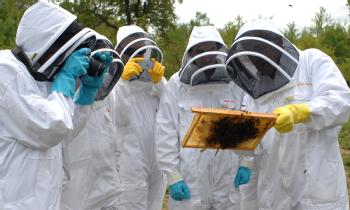Warwick awarded share of £10 million pot to halt decline of honeybee population
 The University of Warwick has been awarded a share of a £10 million research fund to address the decline of honeybees and other insect pollinators.
The University of Warwick has been awarded a share of a £10 million research fund to address the decline of honeybees and other insect pollinators.
In an announcement today (22) by the Biotechnology and Biological Sciences Research Council (BBSRC), the University is one of nine institutions across the UK to receive a grant from the Insect Pollinators Initiative and has been awarded £1 million.
The Insect Pollinators Initiative is a joint initiative with the BBSRC, the Department for Environment, Food and Rural Affairs, the Natural Environment Research Council, the Scottish Government and the Wellcome Trust, and is funded under the auspices of the Living with Environmental Change partnership.
The grant was awarded to scientists in the newly-formed School of Life Sciences (Dr Eugene Ryabov, Dr Yiguo Hong, Dr. James Bull, Dr. David Chandler and Prof. David Evans) and Systems Biology to conduct a research project entitled ‘Unravelling the impact of the mite Varroa destructor on the interaction between the honeybee and its viruses’.
The parasitic mite Varroa was introduced to the UK around 20 years ago and it has had a major impact on honeybee health and beekeeping practice. The mite efficiently transmits viruses between bees and the introduction of Varroa has decimated feral honeybee colonies. Without regular control, Varroa levels in beehives rise significantly causing a decline in colony fitness and excessive winter losses.
The interdisciplinary project will look at the natural genetic variation within the hive to study how honeybees respond to Varroa and the viruses it transmits. By studying the interaction of Varroa and the viruses with the honeybee immune system the research team expect to identify beneficial genes that limit the severity of the viral infections.
Dr Ryabov said: “The team will identify molecular markers for resistance that should make it possible to select and breed bees with reduced susceptibility to Varroa and honeybee viruses. These will benefit beekeepers, farmers and gardeners who rely upon honeybees for pollination, and could influence UK policies relating to bee health and queen importation.”
Warwick researcher Prof. Matt Keeling (School of Life Sciences and Dept. of Mathematics) is a collaborator on another project, studying the epidemiology of European foulbrood, also funded by the Insect Pollinators Initiative.
For more information, visit www.bbsrc.ac.uk/pollinators
Notes to editors
Kelly Parkes-Harrison, Communications Manager, University of Warwick, 02476 150483, 07824 540863, k.e.parkes@warwick.ac.uk
BBSRC External Relations:
Nancy Mendoza, 01793 413355, nancy.mendoza@bbsrc.ac.uk
Tracey Jewitt, 01793 414694, tracey.jewitt@bbsrc.ac.uk
Matt Goode, 017*93 413299, 07766 423372, matt.goode@bbsrc.ac.uk
